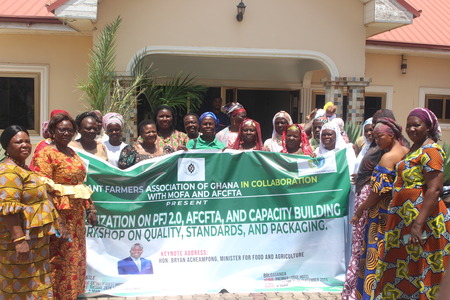Sixty (60) women farmer leaders drawn from several districts in the Northern, Upper East, Upper West and North East regions were sensitized on the Planting for Food and Jobs Phase II (PFJ 2.0) and had their capacity built to influence opportunities under the African Continental Free Trade Area (AfCFTA). The sensitization on the PFJ 2.0 provided the women the opportunity to identify the shortfalls of the program and how they could be integrated into the Aggregator system and also benefit from opportunities under the AfCFTA. This was undertaken during two zonal workshops organized in Tamale and Bolgatanga by the Peasant Farmers Association of Ghana (PFAG), in partnership with the Policy, Planning, Monitoring and Evaluation Directorate (PPMED) of the Ministry of Food and Agriculture (MOFA) and the National AfCFTA Coordinating Office (NCO).
Addressing participants during the training, the Executive Director of PFAG, Dr. Charles Nyaaba, commended government for responding to the calls of PFAG and other stakeholders to review the PFJ programme to respond to the needs of farmers. According to him, the Planting for Food and Jobs Program Phase I, did not deliver value for money as many farmers didn’t not enjoy full benefits of the program. To him, the emphasis of the program to focus on the provision of fertilizer and seeds rather benefited some private individuals at the expense of small holder farmers. He continued that the program’s failure to deal with issue of sub-standard inputs, consistent price increases and debts accounted for its low performance.
With respect to the PFJ 2.0, he was happy that the Ministry agreed with PFAG’s proposal to focus on a value chain approach of supporting farmers. He cited the market opportunities created under the AfCFTA as a great incentive for farmers to fully benefit from government support to expand their productive capacity. He bemoaned the high cost of production, coupled with sub-standard fertilizer and seeds, inadequate infrastructure and low access to credit as some of the major challenges that will limit Ghanaian producers from fully benefitting from the AfCFTA. He emphasized that women farmers and aggregators were particularly disadvantaged, since they have limiting opportunities as compared to their male counterparts. He was hopeful that the PFJ 2.0 will integrate women farmers and aggregators into the program and also enhance their opportunities to explore the AfCFTA market.
To shed light on the PFJ 2.0, a senior official with PPMED, Mr. Charles Adama Ayueboro, presented to participants the modalities of the program. According to him, the PFJ 2.0 is a five year programme that is anchored on four main principles; value chain approach, private sector focused, market driven and inclusivity. The program, will move away from direct input subsidy to a smart agricultural credit, which emphasizes an input credit system, storage and distribution infrastructure, off-taker arrangements, digital agricultural and agribusiness platform and Monitoring and Coordination. The program’s priority commodities include grains and legumes, vegetables, root and tubers and poultry. Accordingly, the program will operate through several key actors including an Aggregator, Financial Institutions, input suppliers and farmers, Mechanization and extension service providers, warehousing infrastructure, off-takers amongst others. The program according to him is expected to lead to improved access to credit, farm inputs and services, structured markets and enhanced food security and resilience. He added that the inclusive nature of the program will ensure that the women farmers and aggregators are not left behind.
Mr. Wilfred Essuman, from the NCO, also highlighted marketing opportunities under the AfCFTA and how women farmers and aggregators can take advantage of. He took the women farmers through the National AfCFTA policy framework and procedures for registration, which included formal registration with all statutory institutions, production of commodities in commercial quantities, how to aggregate and the required standards and measures, improved packaging, competitive pricing and climate friendly farming. The modalities to acquire and apply for a certificate of origin in Ghana and the avenue to register with the outfit were all elaborated upon.
To enhance their capacity to ensure participation, the women farmers were taken through sessions on how to engage policy makers and ensure that their needs and concerns are addressed both in the PFJ 2.0 and AfCFTA. The women were made to identify key issues in the PFJ 2.0 and the AfCFTA. Some of the issues identified included the lack of deliberate targeting of women producers and aggregators under both programs, lack of knowledge on avenue for information and knowledge on both programs, high cost of registration to benefit from the AfCFTA which will deter more women from participating among others.
The participants had the opportunity to share these concerns with the representatives of the two state entities for onward presentation to their respective heads. They were also trained on how to engage frontline policy actors at the local level. The training served as an opportunity to equip them with the needed skills and technique to engage and have their issues resolved. Madam Perpetual, from Navrongo in the Upper East Region stated “I have learnt a lot from this training. When I return, I will mobilize my women group, so that all the issues with have the PFJ 2.0, we will meet and discuss with our district director”. Another woman, Jahwarat from Yendi in the Northern region indicated “I had a lot of questions about the PFJ 2.0 and AfCFTA, but didn’t know who to ask. I’m happy that I had the opportunity to ask and also know where I can get additional information from”.


leave a comment
You must be logged in to post a comment.